《哈姆雷特》第三幕第一场精彩对白tobeornottobe
哈姆雷特第三幕第一场精彩对白
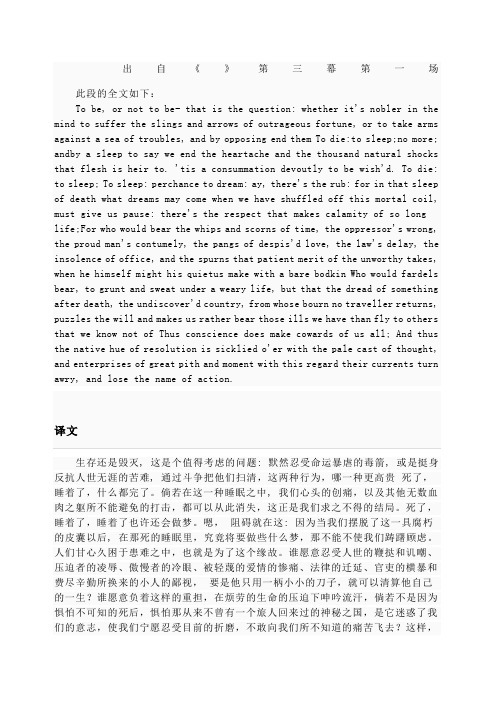
出自《》第三幕第一场此段的全文如下:To be, or not to be- that is the question: whether it's nobler in the mind to suffer the slings and arrows of outrageous fortune, or to take arms against a sea of troubles, and by opposing end them To die:to sleep;no more; andby a sleep to say we end the heartache and the thousand natural shocks that flesh is heir to. 'tis a consummation devoutly to be wish'd. To die: to sleep; To sleep: perchance to dream: ay, there's the rub: for in that sleep of death what dreams may come when we have shuffled off this mortal coil, must give us pause: there's the respect that makes calamity of so long life;For who would bear the whips and scorns of time, the oppressor's wrong, the proud man's contumely, the pangs of despis'd love, the law's delay, the insolence of office, and the spurns that patient merit of the unworthy takes, when he himself might his quietus make with a bare bodkin Who would fardels bear, to grunt and sweat under a weary life, but that the dread of something after death, the undiscover'd country, from whose bourn no traveller returns, puzzles the will and makes us rather bear those ills we have than fly to others that we know not of Thus conscience does make cowards of us all; And thus the native hue of resolution is sicklied o'er with the pale cast of thought, and enterprises of great pith and moment with this regard their currents turn awry, and lose the name of action.译文生存还是毁灭, 这是个值得考虑的问题: 默然忍受命运暴虐的毒箭, 或是挺身反抗人世无涯的苦难, 通过斗争把他们扫清,这两种行为,哪一种更高贵死了,睡着了,什么都完了。
to be or not to be 独白赏析

to be or not to be 独白赏析《哈姆雷特》中的经典名句“To be or not to be, that is the question”是这部莎士比亚的悲剧的一大亮点。
这句名言给人留下了深刻的印象,成为了受人喜爱和传颂的经典之一。
这一句来自于主人公哈姆雷特的一个独白,通过分析这段独白,我们可以深入了解到整个剧本的主题和角色的矛盾心理。
这段独白位于《哈姆雷特》第三幕第一场中。
哈姆雷特在这一幕开始时,正沉浸在深深的悲伤中,对父亲的死及母亲的再婚感到极度的不安和愤怒。
他开始思考生死的问题,自问人们是否应该选择直面苦难和不幸,还是选择自杀来结束一切痛苦。
独白开始时,哈姆雷特提出了这个命题,“To be or not to be”,也就是“生存还是毁灭”,“存在还是不存在”。
这个问题对于每个人来说都是至关重要的,而哈姆雷特在这里不仅代表了一个个体的矛盾,也代表了整个人类对于生命意义的探索。
哈姆雷特之后提到了一个对立的情况,“Whether 'tis noblerin the mind to suffer, the slings and arrows of outrageousfortune, or to take arms against a sea of troubles”。
这里出现的词语“suffer”和“take arms”表达了两种不同的心态和行为方式。
他在思考要么承受生活中的一切困难和痛苦,要么积极地去对抗这一切困难。
这里哈姆雷特对于两种选择都有所犹豫,也无法做出一个明确的决定。
接下来,哈姆雷特开始探讨死亡的自由,“To die, to sleep,no more; and by a sleep to say we end, the heart-ache and the thousand natural shocks that flesh is heir to”。
哈姆雷特将死亡比喻为睡眠,他通过死亡来结束一切痛苦,无需再承受人生的困扰。
《哈姆雷特》(第三幕第一场)学习指导
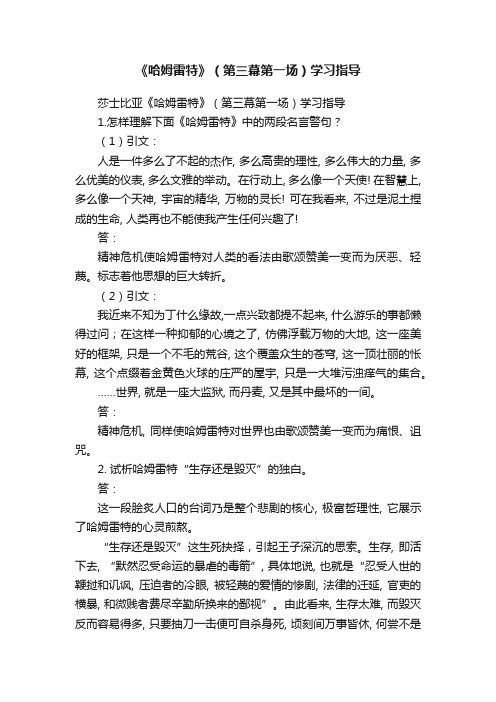
《哈姆雷特》(第三幕第一场)学习指导莎士比亚《哈姆雷特》(第三幕第一场)学习指导1.怎样理解下面《哈姆雷特》中的两段名言警句?(1)引文:人是一件多么了不起的杰作, 多么高贵的理性, 多么伟大的力量, 多么优美的仪表, 多么文雅的举动。
在行动上, 多么像一个天使! 在智慧上, 多么像一个天神, 宇宙的精华, 万物的灵长! 可在我看来, 不过是泥土捏成的生命, 人类再也不能使我产生任何兴趣了!答:精神危机使哈姆雷特对人类的看法由歌颂赞美一变而为厌恶、轻蔑。
标志着他思想的巨大转折。
(2)引文:我近来不知为丁什么缘故,一点兴致都提不起来, 什么游乐的事都懒得过问;在这样一种抑郁的心境之了, 仿佛浮载万物的大地, 这一座美好的框架, 只是一个不毛的荒谷, 这个覆盖众生的苍穹, 这一顶壮丽的怅幕, 这个点缀着金黄色火球的庄严的屋宇, 只是一大堆污浊痒气的集合。
……世界, 就是一座大监狱, 而丹麦, 又是其中最坏的一间。
答:精神危机, 同样使哈姆雷特对世界也由歌颂赞美一变而为痛恨、诅咒。
2. 试析哈姆雷特“生存还是毁灭”的独白。
答:这一段脍炙人口的台词乃是整个悲剧的核心, 极富哲理性, 它展示了哈姆雷特的心灵煎熬。
“生存还是毁灭”这生死抉择,引起王子深沉的思索。
生存, 即活下去, “默然忍受命运的暴虐的毒箭”, 具体地说, 也就是“忍受人世的鞭挝和讥讽, 压迫者的冷眼, 被轻蔑的爱情的惨剧, 法律的迁延, 官吏的横暴, 和微贱者费尽辛勤所换来的鄙视”。
由此看来, 生存太难, 而毁灭反而容易得多, 只要抽刀一击便可自杀身死, 顷刻间万事皆休, 何尝不是一种解脱。
然而, 作为思想家的哈姆雷特具有一般人达不到的深度, 他一旦将这思虑再向纵深开掘, 马上又出现新的问题:倘若如宗教所说, 灵魂不死呢? 那“活着”时的诸多苦难不依旧存在吗? 不还得照样“忍受”吗? 原来, 死不是苦难的结束, 而是苦难的延续, 如果生前不消灭世间的不义, 那死后的梦都得不到宁静。
从语境与语篇谈哈姆莱特独白_Tobe_ornottobe_的理解
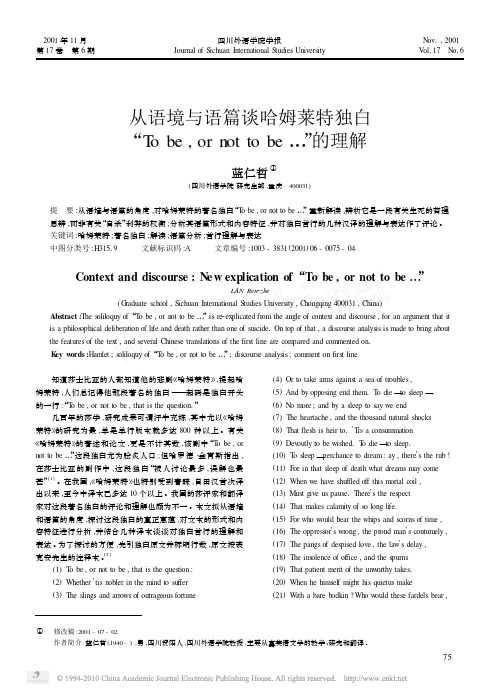
2001年11月第17卷 第6期四川外语学院学报Journal of S ichuan International S tudies UniversityN ov1,2001V ol117 N o16从语境与语篇谈哈姆莱特独白“T o be,or not to be∗”的理解蓝仁哲①(四川外语学院研究生部,重庆 400031)提 要:从语境与语篇的角度,对哈姆莱特的著名独白“T o be,or not to be∗”重新解读,辨析它是一段有关生死的哲理思辨,而非有关“自杀”利弊的权衡;分析其语篇形式和内容特征,并对独白首行的几种汉译的理解与表达作了评论。
关键词:哈姆莱特;著名独白;解读;语篇分析;首行理解与表达中图分类号:H31519 文献标识码:A 文章编号:1003-3831(2001)06-0075-04Context and discourse:N e w explication of“To be,or not to be∗”LAN Ren2zhe(G raduate school,S ichuan International S tudies University,Chongqing400031,China)Abstract:The s oliloquy of“T o be,or not to be∗”is re2explicated from the angle of context and discourse,for an argument that it is a philos ophical deliberation of life and death rather than one of suicide1On top of that,a discourse analysis is made to bring about the features of the text,and several Chinese translations the first line are com pared and commented on1K ey w ords:Hamlet;s oliloquy of“T o be,or not to be∗”;discourse analysis;comment on first line 知道莎士比亚的人都知道他的悲剧《哈姆莱特》,提起哈姆莱特,人们总记得他那段著名的独白———起码是独白开头的一行:“T o be,or not to be,that is the question1”几百年的莎学,研究成果可谓汗牛充栋,其中尤以《哈姆莱特》的研究为最,单是单行版本就多达800种以上。
《哈姆雷特》第三幕第一场精彩对白,to be or not to be教程文件
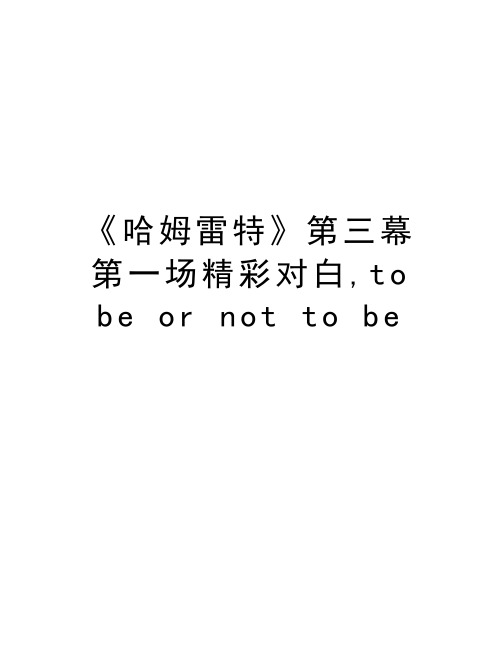
《哈姆雷特》第三幕第一场精彩对白,t o b e o r n o t t o b e此段的全文如下:To be, or not to be- that is the question: whether it's nobler in the mind to suffer the slings and arrows of outrageous fortune, or to take arms against a sea of troubles, and by opposing end them? To die:to sleep;no more; andby a sleep to say we end the heartache and the thousand natural shocks that flesh is heir to. 'tis a consummation devoutly to be wish'd. To die:to sleep; To sleep: perchance to dream: ay, there's the rub: for in that sleep of death what dreams may come when we haveshuffled off this mortal coil, must give us pause: there's the respect that makes calamity of so long life;For who would bear the whips and scorns of time, the oppressor's wrong, the proud man's contumely, the pangs of despis'd love, the law's delay,the insolence of office, and the spurns that patient merit ofthe unworthy takes, when he himself might his quietus make with a bare bodkin? Who would fardels bear, to grunt and sweat under a weary life, but that the dread of something after death, the undiscover'd country, from whose bourn no traveller returns, puzzles the will and makes us rather bear those ills we have than fly to others that we know not of? Thus conscience does make cowards of us all; And thus the native hue of resolution is sicklied o'er with the pale cast of thought, and enterprises of great pith and moment with this regard their currents turn awry, and lose the name of action.生存还是毁灭, 这是个值得考虑的问题: 默然忍受命运暴虐的毒箭, 或是挺身反抗人世无涯的苦难, 通过斗争把他们扫清,这两种行为,哪一种更高贵? 死了,睡着了,什么都完了。
哈姆雷特经典台词tobeornottobe,thatisa
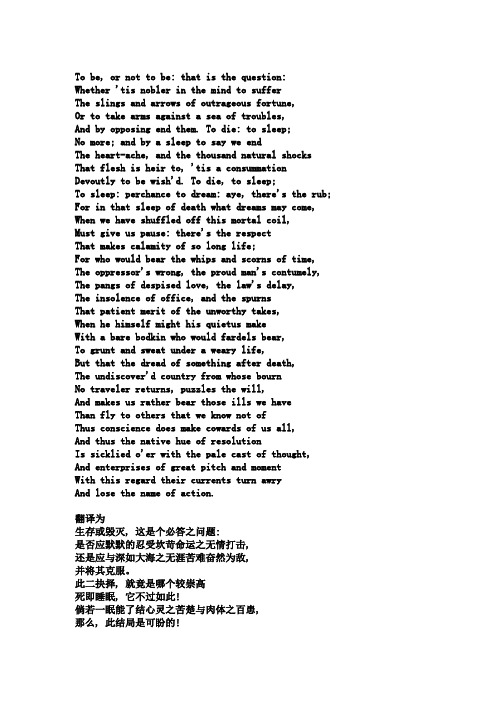
To be, or not to be: that is the question:Whether 'tis nobler in the mind to sufferThe slings and arrows of outrageous fortune,Or to take arms against a sea of troubles,And by opposing end them. To die: to sleep;No more; and by a sleep to say we endThe heart-ache, and the thousand natural shocks That flesh is heir to, 'tis a consummationDevoutly to be wish'd. To die, to sleep;To sleep: perchance to dream: aye, there's the rub; For in that sleep of death what dreams may come, When we have shuffled off this mortal coil,Must give us pause: there's the respectThat makes calamity of so long life;For who would bear the whips and scorns of time, The oppressor's wrong, the proud man's contumely, The pangs of despised love, the law's delay,The insolence of office, and the spurnsThat patient merit of the unworthy takes,When he himself might his quietus makeWith a bare bodkin who would fardels bear,To grunt and sweat under a weary life,But that the dread of something after death,The undiscover'd country from whose bournNo traveler returns, puzzles the will,And makes us rather bear those ills we haveThan fly to others that we know not ofThus conscience does make cowards of us all,And thus the native hue of resolutionIs sicklied o'er with the pale cast of thought, And enterprises of great pitch and momentWith this regard their currents turn awryAnd lose the name of action.翻译为生存或毁灭, 这是个必答之问题:是否应默默的忍受坎苛命运之无情打击,还是应与深如大海之无涯苦难奋然为敌,并将其克服。
to be or not to be赏析
“To be or not to be”是莎士比亚经典戏剧《哈姆雷特》中的一句台词,也是该剧最著名的独白之一。
这句话表达了生存还是毁灭的抉择,展现了对生死、道德、存在意义的深度思考和内心挣扎。
首先,这句话的原文是“To be, or not to be, that is the question: / Whether 'tis nobler in the mind to suffer / The slings and arrows of outrageous fortune, / Or to take arms against a sea of troubles, / And by opposing, end them”。
这段原文以精湛的诗意和优美的语言探讨了生死抉择的主题。
其次,这句话的经典之处在于它所表达的对生存还是毁灭的内心挣扎。
哈姆雷特在面对父王被兄弟谋杀、王位被篡夺的困境中,感到极度痛苦和挣扎。
他面临着复仇的道德困境,既要为父报仇,又要考虑复仇的后果和道德责任。
因此,“To be or not to be”这句台词表达了他内心的矛盾和挣扎。
最后,这句话的艺术效果在于它所展现的对生死、道德、存在意义的深度思考。
它提出了一个永恒的问题:是忍受痛苦和不幸,还是勇敢地面对挑战并试图改变自己的命运?这个问题不仅适用于哈姆雷特,也适用于每一个人。
它让我们思考自己的生活和存在的意义,以及如何在面对困难和挑战时保持勇气和坚强。
总之,“To be or not to be”是一句极具思想深度和人生哲理的经典台词,它让我们对生死、道德、存在意义有了更深刻的认识和理解。
为什么哈姆雷特决定自杀,又后悔了?——再读Tobeornottobe
为什么哈姆雷特决定自杀,又后悔了?——再读Tobeornottobe在莎士比亚的时代,在基督教国家中,自杀是罪。
人们不轻易自杀,但这也抵挡不住某些想自杀的瞬间,真的理由很充分。
在《哈姆雷特》中,自杀的是哈姆雷特的女朋友,她并没有说出自己自杀的原因;但哈姆雷特早早地想就实施这件事情,他说了原因,也说了为何不这样做。
他为何想自杀?——原因跟现代人并无二致。
The slings and arrows of outrageous fortune愤怒的命运向我们的扔出的石头和利箭a sea of troubles一亿吨麻烦calamity of so long life这一生就是灾难whips and scorns of time时间鞭笞我们嘲笑我们具体有哪些麻烦呢?比如Th' oppressor's wrong压迫者的凌辱the proud man's contumely,傲慢者的冷眼The pangs of despis'd love,被轻蔑的爱情的惨痛the law's delay,法律的迁延The insolence of office官吏的横暴the spurns / That patient merit of th' unworthy takes,费尽辛勤所换来的小人的鄙视让大家失落的生活中的事情,不也是这些吗?一根根稻草压下来,死了平静,还是苟且偷生,承受它们呢?哈姆雷特没有选择死亡。
因为死亡并不意味着解脱。
因为死亡之后会去哪里,会消失,还是继续在陌生国度遭受也许更加残酷的灾难,没有知道!To die —to sleep.To sleep —perchance to dream: ay, there's the rub!For in that sleep of death what dreams may come那死的睡眠里,究竟将要做些什么梦呢?...the dread of something after death—The undiscover'd country, from whose bournNo traveller returns —puzzles the will惧怕不可知的死后,惧怕那从来不曾有一个旅人回来过的神秘之国,是它迷惑了我们的意志这样的迷惑,就够了。
《哈姆雷特》第三幕第一场精彩对白_to_be_or_not_to_be
生存还是毁灭, 这是个值得考虑的问题:
默然忍受命运暴虐的毒箭, 或是挺身反抗人世无涯的苦难,
通过斗争把他们扫清,这两种行为,哪一种更高贵?
死了,睡着了,什么都完了。
倘若在这一种睡眠之中,
我们心头的创痛,以及其他无数血肉之躯所不能避免的打击,
都可以从此消失,这正是我们求之不得的结局。
死了,睡着了,睡着了也许还会做梦。
嗯,阻碍就在这: 因为当我们摆脱了这一具腐朽的皮囊以后,
在那死的睡眠里,究竟将要做些什么梦,那不能不使我们踌躇顾虑。
人们甘心久困于患难之中,也就是为了这个缘故。
谁愿意忍受人世的鞭挞和讥嘲、压迫者的凌辱、傲慢者的冷眼、被轻蔑的爱情的惨痛、法律的迁延、官吏的横暴和费尽辛勤所换来的小人的鄙视,
要是他只用一柄小小的刀子,就可以清算他自己的一生?
谁愿意负着这样的重担,在烦劳的生命的压迫下呻吟流汗,
倘若不是因为惧怕不可知的死后,惧怕那从来不曾有一个旅人回来过的神秘之国,
是它迷惑了我们的意志,使我们宁愿忍受目前的折磨,
不敢向我们所不知道的痛苦飞去?这样,重重的顾虑使我们全变成了懦夫,
决心的炽热的光彩,被审慎的思维盖上了一层灰色,
伟大的事业在这一种考虑下,也会逆流而退,失去了行动的意义。
----《哈姆雷特》(英-莎士比亚)中的经典独白。
2020年3月5日《哈姆莱特(节选)》第三幕第一场第一、第二课时
《哈姆莱特(节选)》导学案[学习目标]:1、结合注释、背景梳理戏剧情节。
2、品味富有个性的戏剧语言,把握内心独白在戏剧表演中的效果。
3、探究人物性格形成的深层原因。
第一课时【作家作品】1、莎士比亚,杰出的戏剧家和诗人,是欧洲文艺复兴时期人文主义文学的集大成者。
他一生创作了诸多经典的戏剧,我们比较熟悉他的悲喜剧《罗密欧与朱丽叶》。
除此之外,他笔下的四大悲剧分别是《李尔王》《奥赛罗》《麦克白》和《哈姆莱特》,四大喜剧有《仲夏夜之梦》《威尼斯商人》《第十二夜》《终成眷属》,还有历史剧《亨利四世》《亨利五世》《理查二世》等。
本·琼生称他为“时代的灵魂”,马克思称他和古希腊的埃斯库罗斯为“人类最伟大的戏剧天才”。
莎士比亚生活在文艺复兴时期的欧洲,文艺复兴唤起了人的觉醒,人们重视个性与思想解放,同时某种程度上造成了私欲膨胀社会混乱的情况出现。
莎士比亚对人生和时代作出深入思考后,着力塑造了一些新时代的悲剧主人公:他们从中世纪的禁锢和蒙昧中醒来,雄心勃勃地想要发展或完善自己,但又不能克服时代和自身的局限,在同环境和内心敌对势力的力量悬殊斗争中,遭到不可避免的失败和牺牲。
《哈姆莱特》正代表了莎士比亚对这种理想与进步背后隐患和人性弱点的反思。
2.莎士比亚戏剧创作可以分为三个时期:早期:历史剧、喜剧时期。
写出了《亨利四世》、《理查三世》等9部历史剧,《仲夏夜之梦》、《威尼斯商人》、《第十二夜》等10部喜剧和《罗密欧与朱丽叶》等3部悲剧。
中期:悲剧时期。
四大悲剧:《哈姆莱特》、《奥赛罗》、《李尔王》、《麦克白》后期:传奇剧时期。
一生共创作剧本37部。
154首14行诗。
【题目解说】“哈姆莱特”是故事的主人公,《哈姆莱特》这部戏剧讲述的是青年王子哈姆莱特为父亲复仇,最后与仇人同归于尽的故事,表现了莎士比亚对文艺复兴运动的深刻反思以及对人的命运与前途的深切关注。
二、【写作背景】莎士比亚生活在欧洲历史上封建制度日趋没落、资本主义逐渐兴起的交替时代。
- 1、下载文档前请自行甄别文档内容的完整性,平台不提供额外的编辑、内容补充、找答案等附加服务。
- 2、"仅部分预览"的文档,不可在线预览部分如存在完整性等问题,可反馈申请退款(可完整预览的文档不适用该条件!)。
- 3、如文档侵犯您的权益,请联系客服反馈,我们会尽快为您处理(人工客服工作时间:9:00-18:30)。
出自《哈姆雷特》第三幕第一场此段的全文如下:
To be, or not to be- that is the question: whether it's nobler in the mind to suffer the slings and arrows of outrageous fortune, or to take arms against a sea of troubles, and by opposing end them? To die:to sleep;no more; andby a sleep to say we end the heartache and the thousand natural shocks that flesh is heir to. 'tis a consummation devoutly to be wish'd. To die: to sleep; To sleep: perchance to dream: ay, there's the rub: for in that sleep of death what dreams may come when we have shuffled off this mortal coil, must give us pause: there's the respect that makes calamity of so long life;For who would bear the whips and scorns of time, the oppressor's wrong, the proud man's contumely, the pangs of despis'd love, the law's delay, the insolence of office, and the spurns that patient merit of the unworthy takes, when he himself might his quietus make with a bare bodkin? Who would fardels bear, to grunt and sweat under a weary life, but that the dread of something after death, the undiscover'd country, from whose bourn no traveller returns, puzzles the will and makes us rather bear those ills we have than fly to others that we know not of? Thus conscience does make cowards of us all; And thus the native hue of resolution is sicklied o'er with the pale cast
of thought, and enterprises of great pith and moment with this regard their currents turn awry, and lose the name of action.
生存还是毁灭, 这是个值得考虑的问题: 默然忍受命运暴虐的毒箭, 或是挺身反抗人世无涯的苦难, 通过斗争把他们扫清,这两种行为,哪一种更高贵? 死了,睡着了,什么都完了。
倘若在这一种睡眠之中, 我们心头的创痛,以及其他无数血肉之躯所不能避免的打击,都可以从此消失,这正是我们求之不得的结局。
死了,睡着了,睡着了也许还会做梦。
嗯,阻碍就在这: 因为当我们摆脱了这一具腐朽的皮囊以后, 在那死的睡眠里,究竟将要做些什么梦,那不能不使我们踌躇顾虑。
人们甘心久困于患难之中,也就是为了这个缘故。
谁愿意忍受人世的鞭挞和讥嘲、压迫者的凌辱、傲慢者的冷眼、被轻蔑的爱情的惨痛、法律的迁延、官吏的横暴和费尽辛勤所换来的小人的鄙视,要是他只用一柄小小的刀子,就可以清算他自己的一生?谁愿意负着这样的重担,在烦劳的生命的压迫下呻吟流汗,倘若不是因为惧怕不可知的死后,惧怕那从来不曾有一个旅人回来过的神秘之国,是它迷惑了我们的意志,使我们宁愿忍受目前的折磨,不敢向我们所不知道的痛苦飞去?这样,重重的顾虑使我们全变成了懦夫,决心的炽热的光彩,被审慎的思维盖上了一层灰色,伟大的事业在这一种考虑下,也会逆流而退,失去了行动的意义。
----《哈姆雷特》(英-莎士比亚)中的经典独白。
